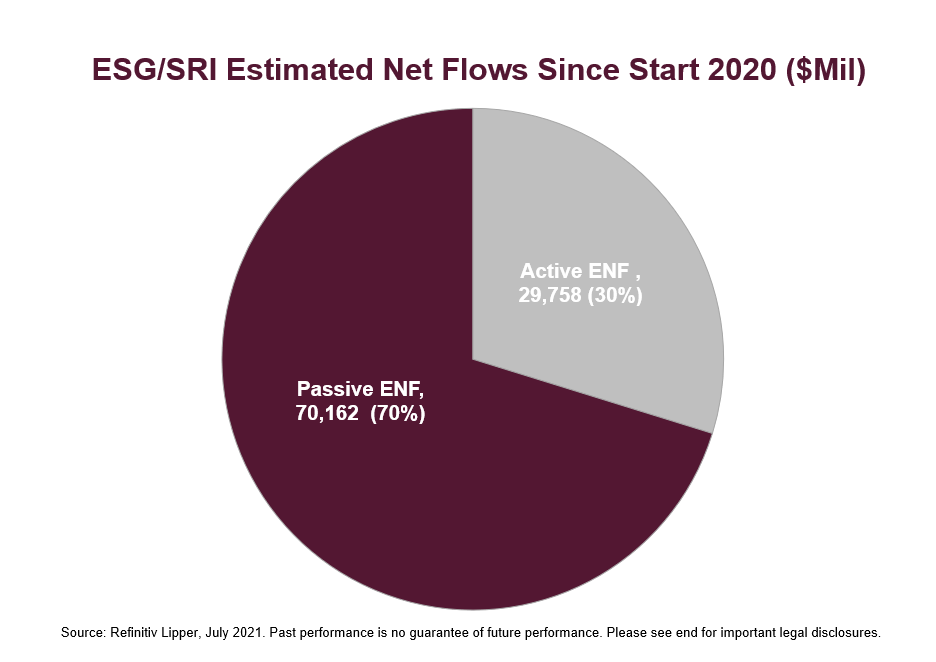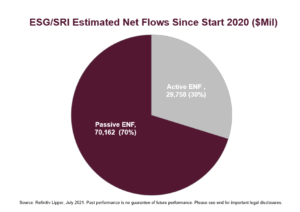By Carolyn Eagle, senior product manager, FTSE Russell and Jack Fischer, senior research analyst, Refinitiv Lipper
Interest in ESG at all time high
More institutional investors across the globe are considering ESG than ever before. A 2020 survey by FTSE Russell found that more than 7 in 10 asset owners globally are evaluating and implementing sustainable investment considerations in their investment strategies and among those using and/or evaluating smart beta strategies, 58% anticipate applying sustainable investment (SI) considerations to their smart beta strategy, up from 44% in 2019[1].
In North America, a region that has historically lagged other parts of the world on ESG investing, the share of asset owners that indicated interest in applying SI/ESG considerations to smart beta strategies jumped to 42% in 2020, from just 17% in 2019. Sustainable investment strategies continue to broaden, with a greater emphasis on more sophisticated approaches such as re-weighting based on SI and ESG factors (from 36% in 2019 to 55% in 2020) compared to more basic negative screening (64% in 2019 to 48% in 2020)[2].
Are fund flows matching interest levels?
In short, yes. The growth in interest is translating to a growth in assets in the US. ESG/SRI AUM in the US is up to $550 billion, an 88% increase since 2018[3]. With our colleagues at Refinitiv Lipper we asked the question What kinds of ESG strategies are attracting that AUM? Firstly, it’s important to understand definitions. Lipper’s ESG/ SRI universe of funds consists of funds that meet specific criteria to obtain one of the following flags: Social, Environment, Green, Ethical, and/or Religious[4].
Fund flow data from Lipper indicates that most of the sustainable fund flows are into passive equity strategies. In fact, according to Lipper, since the start of 2020, passive ESG/SRI funds saw ~70% of total inflows compared to active ESG/SRI funds (Chart 1) while only accounting for ~30% of total AUM in ESG/SRI funds (Chart 2). While active ESG equity estimated net flows are hovering around zero (meaning about as much AUM is flowing out as flowing in), ESG passive equity AUM estimate net flows are positive, and even ticking up in recent months.

Click here to read the full article
[1] Smart Sustainability: 2020 global survey findings from asset owners, FTSE Russell.
[2] Smart Sustainability: 2020 global survey findings from asset owners, FTSE Russell.
[3] Source: Refinitiv Lipper. Includes both active and previously liquidated funds (ETFs and mutual funds).
[4] Social: A flag that identifies funds that use social criteria as part of their investment policy.
Environment: identifies funds that include environmental impact in their overall process.
Green: identifies funds whose main screening criteria/investment strategy is based primarily on environmentally friendly investments.
Ethical: indicates if the fund only invests in securities identified as ethical according to its mandate and avoids investing in stocks identified as unethical.
Religious: identifies funds that have adopted investment policies and/or screens their investments based on specific religious values or beliefs.
—
Originally Posted on September 29, 2021 – ESG In Passive Investing: The US Equity Fund Faucet Opens
Disclosure: FTSE Russell
Interactive Advisors, a division of Interactive Brokers Group, offers FTSE Russell Index Tracker portfolios on its online investing marketplace. Learn more about the Diversified Portfolios.
This material is not intended as investment advice. Interactive Advisors or portfolio managers on its marketplace may hold long or short positions in the companies mentioned through stocks, options or other securities.
© 2023 London Stock Exchange Group plc and its applicable group undertakings (the “LSE Group”). The LSE Group includes (1) FTSE International Limited (“FTSE”), (2) Frank Russell Company (“Russell”), (3) FTSE Global Debt Capital Markets Inc. and FTSE Global Debt Capital Markets Limited (together, “FTSE Canada”), (4) MTSNext Limited (“MTSNext”), (5) Mergent, Inc. (“Mergent”), (6) FTSE Fixed Income LLC (“FTSE FI”), (7) The Yield Book Inc (“YB”) and (8) Beyond Ratings S.A.S. (“BR”). All rights reserved.
FTSE Russell® is a trading name of FTSE, Russell, FTSE Canada, MTSNext, Mergent, FTSE FI, YB and BR. “FTSE®”, “Russell®”, “FTSE Russell®”, “MTS®”, “FTSE4Good®”, “ICB®”, “Mergent®”, “The Yield Book®”, “Beyond Ratings®“ and all other trademarks and service marks used herein (whether registered or unregistered) are trademarks and/or service marks owned or licensed by the applicable member of the LSE Group or their respective licensors and are owned, or used under licence, by FTSE, Russell, MTSNext, FTSE Canada, Mergent, FTSE FI, YB or BR. FTSE International Limited is authorised and regulated by the Financial Conduct Authority as a benchmark administrator.
All information is provided for information purposes only. All information and data contained in this publication is obtained by the LSE Group, from sources believed by it to be accurate and reliable. Because of the possibility of human and mechanical error as well as other factors, however, such information and data is provided “as is” without warranty of any kind. No member of the LSE Group nor their respective directors, officers, employees, partners or licensors make any claim, prediction, warranty or representation whatsoever, expressly or impliedly, either as to the accuracy, timeliness, completeness, merchantability of any information or of results to be obtained from the use of the FTSE Russell products, including but not limited to indexes, data and analytics or the fitness or suitability of the FTSE Russell products for any particular purpose to which they might be put. Any representation of historical data accessible through FTSE Russell products is provided for information purposes only and is not a reliable indicator of future performance.
No responsibility or liability can be accepted by any member of the LSE Group nor their respective directors, officers, employees, partners or licensors for (a) any loss or damage in whole or in part caused by, resulting from, or relating to any error (negligent or otherwise) or other circumstance involved in procuring, collecting, compiling, interpreting, analysing, editing, transcribing, transmitting, communicating or delivering any such information or data or from use of this document or links to this document or (b) any direct, indirect, special, consequential or incidental damages whatsoever, even if any member of the LSE Group is advised in advance of the possibility of such damages, resulting from the use of, or inability to use, such information.
No member of the LSE Group nor their respective directors, officers, employees, partners or licensors provide investment advice and nothing contained herein or accessible through FTSE Russell products, including statistical data and industry reports, should be taken as constituting financial or investment advice or a financial promotion.
Past performance is no guarantee of future results. Charts and graphs are provided for illustrative purposes only. Index returns shown may not represent the results of the actual trading of investable assets. Certain returns shown may reflect back-tested performance. All performance presented prior to the index inception date is back-tested performance. Back-tested performance is not actual performance, but is hypothetical. The back-test calculations are based on the same methodology that was in effect when the index was officially launched. However, back- tested data may reflect the application of the index methodology with the benefit of hindsight, and the historic calculations of an index may change from month to month based on revisions to the underlying economic data used in the calculation of the index.
This document may contain forward-looking assessments. These are based upon a number of assumptions concerning future conditions that ultimately may prove to be inaccurate. Such forward-looking assessments are subject to risks and uncertainties and may be affected by various factors that may cause actual results to differ materially. No member of the LSE Group nor their licensors assume any duty to and do not undertake to update forward-looking assessments.
No part of this information may be reproduced, stored in a retrieval system or transmitted in any form or by any means, electronic, mechanical, photocopying, recording or otherwise, without prior written permission of the applicable member of the LSE Group. Use and distribution of the LSE Group data requires a licence from FTSE, Russell, FTSE Canada, MTSNext, Mergent, FTSE FI, YB, BR and/or their respective licensors.
Disclosure: Interactive Brokers
Information posted on IBKR Campus that is provided by third-parties does NOT constitute a recommendation that you should contract for the services of that third party. Third-party participants who contribute to IBKR Campus are independent of Interactive Brokers and Interactive Brokers does not make any representations or warranties concerning the services offered, their past or future performance, or the accuracy of the information provided by the third party. Past performance is no guarantee of future results.
This material is from FTSE Russell and is being posted with its permission. The views expressed in this material are solely those of the author and/or FTSE Russell and Interactive Brokers is not endorsing or recommending any investment or trading discussed in the material. This material is not and should not be construed as an offer to buy or sell any security. It should not be construed as research or investment advice or a recommendation to buy, sell or hold any security or commodity. This material does not and is not intended to take into account the particular financial conditions, investment objectives or requirements of individual customers. Before acting on this material, you should consider whether it is suitable for your particular circumstances and, as necessary, seek professional advice.


























